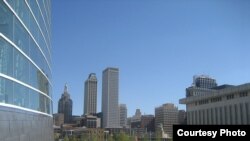When Americans think about “conventions,” we picture lavish get-togethers of corporations or trade associations in places such as glitzy Las Vegas, romantic New Orleans, suave New York City, bustling Chicago, and historic San Francisco. Indeed, these and a few other big cities top the list of traditional convention venues.
But because of today’s fragile economy and tighter restrictions on corporate and government travel, some smaller cities have emerged as popular convention sites. Even the big political conventions this year will not be held in a New York or Chicago or Dallas. In a couple of weeks, the Republicans will convene in Tampa, Florida. And right afterward, the Democrats will meet in Charlotte, North Carolina.
Medium-sized centers such as Fargo, North Dakota, and Chattanooga, Tennessee, are picking up regional conventions that delegates can attend easily and relatively inexpensively.
A good example is Tulsa, Oklahoma, population just 400,000. Its convention calendar is full many weeks of the year.
Why would anyone meet in an old oil-drilling town on the Midwest prairie?
Well, Tulsa is smack in the middle of the country and easy and fairly cheap to get to. Hotel rooms, meeting spaces, and restaurant meals cost a fraction of what they would in Vegas or New York. And you can get anywhere in town in 20 minutes. Besides a fine aquarium, there are countless cowboy, oilfield, and American Indian historical sites to explore.
Even more appealing, according to conventioneers who’ve been there, are intangibles such the "howdy" greeting you get all over town. Every visitor's a big shot. To prove it, there are banners everywhere you go, welcoming the latest group of foot doctors or accountants to town.
In short, middling-sized cities such as Tulsa, Oklahoma, are big enough to have everything visitors need, cozy enough to make them feel welcome, and inexpensive enough to please the bean-counters back at the office.
But because of today’s fragile economy and tighter restrictions on corporate and government travel, some smaller cities have emerged as popular convention sites. Even the big political conventions this year will not be held in a New York or Chicago or Dallas. In a couple of weeks, the Republicans will convene in Tampa, Florida. And right afterward, the Democrats will meet in Charlotte, North Carolina.
Medium-sized centers such as Fargo, North Dakota, and Chattanooga, Tennessee, are picking up regional conventions that delegates can attend easily and relatively inexpensively.
A good example is Tulsa, Oklahoma, population just 400,000. Its convention calendar is full many weeks of the year.
Why would anyone meet in an old oil-drilling town on the Midwest prairie?
Well, Tulsa is smack in the middle of the country and easy and fairly cheap to get to. Hotel rooms, meeting spaces, and restaurant meals cost a fraction of what they would in Vegas or New York. And you can get anywhere in town in 20 minutes. Besides a fine aquarium, there are countless cowboy, oilfield, and American Indian historical sites to explore.
Even more appealing, according to conventioneers who’ve been there, are intangibles such the "howdy" greeting you get all over town. Every visitor's a big shot. To prove it, there are banners everywhere you go, welcoming the latest group of foot doctors or accountants to town.
In short, middling-sized cities such as Tulsa, Oklahoma, are big enough to have everything visitors need, cozy enough to make them feel welcome, and inexpensive enough to please the bean-counters back at the office.




